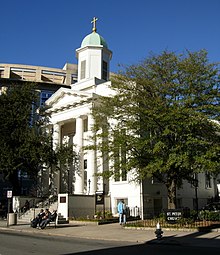St. Peter's Pro-Cathedral is a Catholic church located in Richmond, Virginia, United States. It is the oldest Catholic church in the city. From the erecting of the Diocese of Richmond in 1850 until the completion of the Cathedral of the Sacred Heart in 1906, St. Peter's Church served as the cathedral and seat of the diocese.[3] Originally, the church was predominantly Irish American. The church continued to serve a congregation of approximately 300 as of 2011.[4]
| St. Peter's Pro-Cathedral | |
|---|---|
 | |
| Religion | |
| Affiliation | Roman Catholic |
| Status | Active |
| Location | |
| Location | 800 E. Grace St., Richmond, Virginia, United States of America |
| Architecture | |
| Style | Neoclassical |
| Completed | 1834 |
| Specifications | |
| Direction of façade | southwest |
| Materials | |
St. Peter's Pro-Cathedral | |
| Location | 800 E. Grace St., Richmond, Virginia |
| Coordinates | 37°32′26″N 77°26′8″W / 37.54056°N 77.43556°W |
| Area | 0.2 acres (0.081 ha) |
| Built | 1834 |
| Architectural style | Romanesque |
| NRHP reference No. | 69000358[1] |
| VLR No. | 127-0015 |
| Significant dates | |
| Added to NRHP | June 23, 1969 |
| Designated VLR | November 5, 1968[2] |
| Website | |
| http://www.stpeterchurch1834.org/ | |
After the Civil War, St. Peter's basement hosted the city's "colored Catholics." The 13-member congregation included Emily Mitchell (born into slavery in 1824, brought from Baltimore and later serving Bishop James Gibbons), Julia Grandison (baptised in Georgia and brought to Richmond at age 9), Moses Marx (who began driving Bishop John Keane's buggy at age 12), Liza Marx (who learned to read and reminded the judge reading her mistress' will that he forgot the lines bequeathing money to Elizabeth Thompson and her next child of issue), and Julia Flippen as well as her children.[5] When the congregation had increased to about 50, including children, Bishop Keane signed a deed for what became St. Jos Church on Shockoe Hill, also inviting the Josephites for help in furthering the Black apostolate.[6]
In 2020 the parish was designated a pro-cathedral as part of the Diocese of Richmond bicentennial celebration.[7]
Gallery
edit-
A photograph of the church from a 1914 publication
See also
editReferences
edit- ^ "National Register Information System". National Register of Historic Places. National Park Service. July 9, 2010.
- ^ "Virginia Landmarks Register". Virginia Department of Historic Resources. Retrieved 19 March 2013.
- ^ "St. Peter's Church" (PDF). Virginia Department of Historic Resources. Retrieved 1 May 2011.
- ^ "Our History". St. Peter's Church. Archived from the original on 26 February 2012. Retrieved 1 May 2011.
- ^ Nessa Theresa Baskerville Johnson, A Special Pilgrimaage: A History of Black Catholics in Richmond (Diocese of Richmond, 1978) at pp. 13-15
- ^ Johnson, pp. 16-18
- ^ "Saint Peter's Pro-Cathedral".

